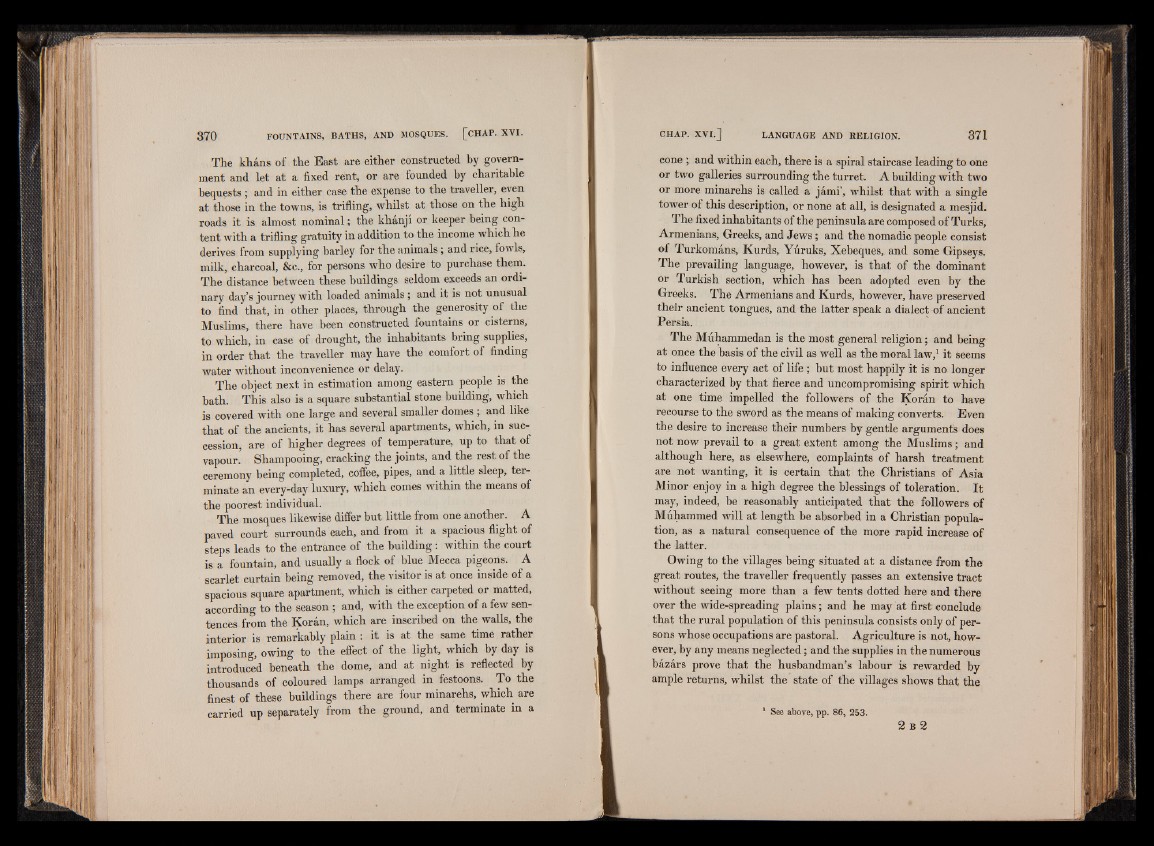
The khans of the East are either constructed by government
and let at a fixed rent, or are founded by charitable
bequests; and in either case the expense to the traveller, even
at those in the towns, is trifling, whilst at those on the high
roads it is almost nominal; the khanji or keeper being content
with a trifling gratuity in addition to the income which he
derives from supplying barley for the animals; and rice, fowls,
milk, charcoal, &c., for persons who desire to purchase them.
The distance between these buildings seldom exceeds an ordinary
day’s journey with loaded animals ; and it is not unusual
to find that, in other places, through the generosity of the
Muslims, there have been constructed fountains or cisterns,
to which, in case of drought, the inhabitants bring supplies,
in order that the traveller may have the comfort of finding
water without inconvenience or delay.
The object next in estimation among eastern people is the
bath. This also is a square substantial stone building, which
is covered with one large and several smaller domes j and like
that of the ancients, it has several apartments, which, in succession,
are of higher degrees of temperature, up to that of
vapour. Shampooing, cracking the joints, and the rest of the
ceremony being completed, coffee, pipes, and a little sleep, terminate
an every-day luxury, which comes within the means of
the poorest individual.
The mosques likewise differ but little from one another. A
paved court surrounds each, and from it a spacious flight of
steps leads to the entrance of the building: within the court
is a fountain, and usually a flock of blue Mecca pigeons. A
scarlet curtain being removed, the visitor is at once inside of a
spacious square apartment, which is either carpeted or matted,
according to the season ; and, with the exception of a few sentences
from the Koran, which are inscribed on the walls, the
interior is remarkably plain : it is at the same time rather
imposing, owing to the effect of the light, which by day is
introduced beneath the dome, and at night is reflected by
thousands of coloured lamps arranged in festoons. To the
finest of these buildings there are four minarehs, which are
carried up separately from the ground, and terminate in a
cone ; and within each, there is a spiral staircase leading to one
or two galleries surrounding the turret. A building with two
or more minarehs is called a jami’, whilst that with a single
tower of this description, or none at all, is designated a mesjid.
The fixed inhabitants of the peninsula are composed of Turks,
Armenians, Greeks, and Jews; and the nomadic people consist
of Turkomans, Kurds, Yuruks, Xebeques, and some Gipseys.
The prevailing language, however, is that of the dominant
or Turkish section, which has been adopted even by the
Greeks. The Armenians and Kurds, however, have preserved
their ancient tongues, and the latter speak a dialect of ancient
Persia.
The Muhammedan is the most general religion; and being
at once the basis of the civil as well as the moral law,1 it seems
to influence every act of life ; but most happily it is no longer
characterized by that fierce and uncompromising spirit which
at one time impelled the followers of the Koran to have
recourse to the sword as the means of making converts. Even
the desire to increase their numbers by gentle argument's does
not now prevail to a great extent among the Muslims; and
although here, as elsewhere, complaints of harsh treatment
are not wanting, it is certain that the Christians of Asia
Minor enjoy in a high degree the blessings of toleration. It
may, indeed, be reasonably anticipated that the followers of
Muhammed will at length be absorbed in a Christian population,
as a natural consequence of the more rapid increase of
the latter.
Owing to the villages being situated at a distance from the
great routes, the traveller frequently passes an extensive tract
without seeing more than a few tents dotted here and there
over the wide-spreading plains; and he may at first conclude
that the rural population of this peninsula consists only of persons
whose occupations are pastoral. Agriculture is not, however,
by any means neglected; and the supplies in the numerous
bazars prove that the husbandman’s labour is rewarded by
ample returns, whilst the state of the villages shows that the
1 See above, pp. 86, 253.
2 B 2